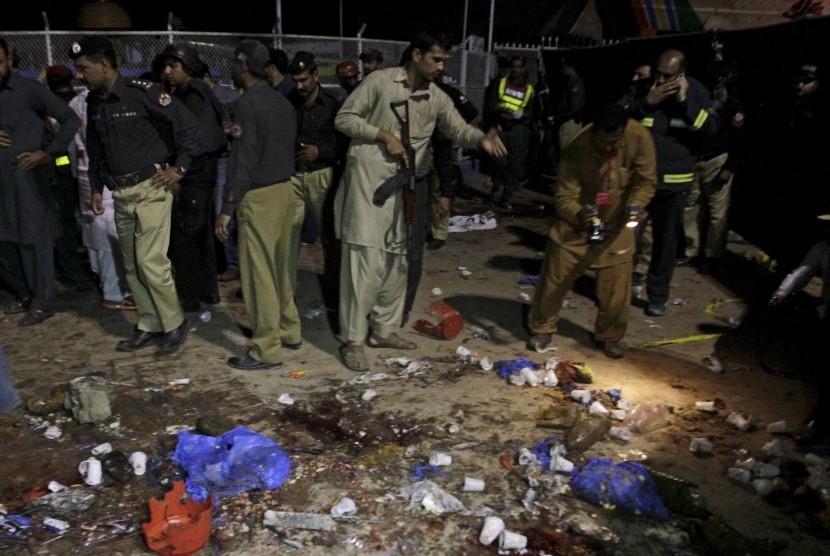REPUBLIKA.CO.ID, LAHORE -- Pakistan has decided to launch a paramilitary crackdown on Islamist militants in Punjab, the country's richest and most populous province, after an Easter Day bombing killed 70 people in the provincial capital Lahore, officials said on Monday.
Sunday's suicide bombing at a public park was claimed by the Pakistani Taliban's Jamaat-ur-Ahrar faction, which once declared loyalty to Islamic State. The group said it was targeting Christians.
The brutality of the attack, Jamaat-ur-Ahrar's fifth bombing since December, reflects the movement's attempts to raise its profile among Pakistan's increasingly fractured Islamist militants.
At least 29 children enjoying an Easter weekend outing were among those killed when the suicide bomber struck in a busy park in the eastern city of Lahore, the power base of Prime Minister Nawaz Sharif. Pakistan is a majority-Muslim state but has a Christian population of more than two million.
Pope Francis condemned the attack as "hideous" and demanded that Pakistani authorities protect religious minorities.
It was Pakistan's deadliest attack since the December 2014 massacre of 134 school children at a military-run academy in the city of Peshawar that prompted a government crackdown on militants.
Security and government officials told Reuters the decision had been made to launch a full-scale operation involving the paramilitary Rangers, who would have powers to conduct raids and interrogate suspects in the same way as they have been doing in the southern city of Karachi for more than two years.
The move, which has not yet been formally announced, represents the civilian government once again granting special powers to the military to fight militants.
"The technicalities are yet to be worked out. There are some legal issues also with bringing in Rangers, but the military and government are on the same page," said one senior security official, speaking on condition of anonymity as he was not authorised to share details of the plan.
One other military official and two government officials confirmed the decision on condition of anonymity.
"The PM ordered a joint operation of the counter-terrorism department and Rangers in the border areas of Punjab against terrorists and their facilitators," said one government official who attended a meeting with Sharif and Punjab officials on Monday.
The move is likely to be controversial in Punjab. In Karachi, the Rangers' crackdown has drawn accusations of human rights abuses and the targeting of opposition politicians, though the rate of militant and criminal violence has dropped sharply since the paramilitary force arrived.
Sharif's own party has long opposed any militarised operation against militants in its Punjab heartland.
"FAILURE IS THEIR FATE"
Military spokesman Gen. Asim Bajwa said intelligence agencies, the army and Rangers had already launched several raids around Punjab following the attack, arresting an unspecified number of suspects and recovering arms caches.
Sharif visited the wounded in hospitals and described the attackers as a "coward enemy trying for soft targets".
"Terrorists should know that failure is their fate," he said in a television address to the nation, vowing to crush them.
Claiming responsibility on Sunday for the attack on behalf of Jamaat-ur-Ahrar, spokesman Ehsanullah Ehsan issued a direct challenge to the government: "We want to send this message to Prime Minister Nawaz Sharif that we have entered Lahore."
Rescue services spokeswoman Deeba Shahnaz said at least 29 children, seven women and 34 men had been killed and about 340 people wounded, with 25 in serious condition.
Jamaat-ur-Ahrar has claimed responsibility for several big attacks since it split from the main Pakistani Taliban in 2014.
While it mostly focuses attacks in its base of the northwestern Mohmand tribal area, it has previously carried out at least two major attacks in Lahore: one in 2015 that targeted two Christian churches and another at the Wagah border between India and Pakistan in late 2014.
Pakistan has been plagued by militant violence since it joined a U.S.-led campaign against Islamist militancy after the Sept. 11, 2001, al Qaeda attacks on the United States.
While the army, police, government and Western interests have been the prime targets of the Pakistani Taliban and their allies, Christians and other religious minorities have also been attacked.
Security forces have killed and arrested hundreds of suspected militants under an earlier crackdown launched after the 2014 Peshawar school massacre. Militant violence eased, but groups retain the ability to launch devastating attacks.
Most militants, like the Pakistani Taliban, want to topple the government and introduce a strict version of Islamic law.


